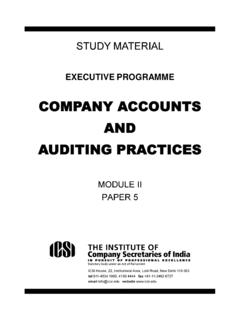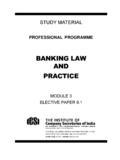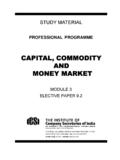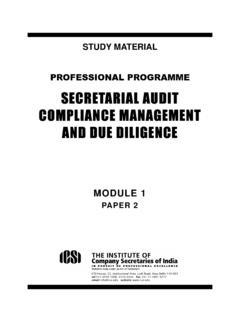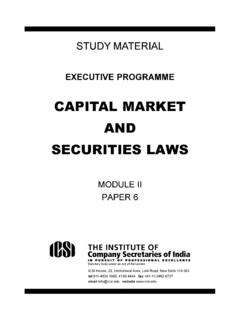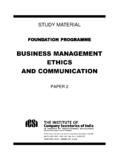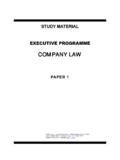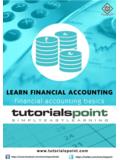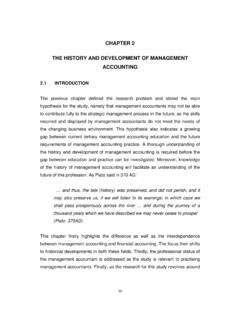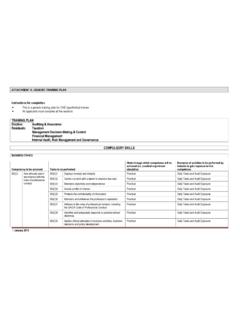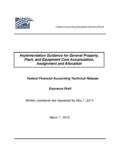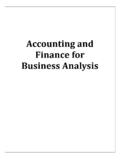Transcription of FUNDAMENTALS OF ACCOUNTING AND AUDITING
1 ISTUDY MATERIALFOUNDATION PROGRAMMEFUNDAMENTALS OFACCOUNTING ANDAUDITINGPAPER 4 ICSI House, 22, Institutional Area, Lodi Road, New Delhi 110 003tel 011-4534 1000, 4150 4444fax +91-11-2462 6727email THE INSTITUTE OF COMPANY SECRETARIES OF INDIATIMING OF HEADQUARTERSM onday to FridayOffice Timings to Dealing TimingsWithout financial transactions to financial transactions to , Typesetting by AArushi Graphics, Prashant Vihar, New Delhi, andPrinted at M P Printers/10000/February 2012iiiiiFOUNDATION PROGRAMME IMPORTANT NOTEThe study material has been written in lucid and simple language and conscious efforts have been made toexplain the fundamental concepts and principles of ACCOUNTING and AUDITING .
2 This study material is divided intotwo main parts Part-AFundamentals of ACCOUNTING , andPart-BFundamentals of AuditingThe institute has decided that the first examination for Foundation Programme under new syllabus will be heldfrom December 2012 session in the Optical Mark Recognition (OMR) format, whereby students are required toanswer multiple choice questions on OMR sheet by darkening the appropriate choice by HB pencil. One markwill be awarded for each correct answer. There is NO NEGATIVE mark for incorrect specimen OMR sheet is appended at the end of the study material. There are two self test question papersin the study to acquaint students with the pattern of examination.
3 These are for practice purpose only, not to besent to the supplementing the information contained in the study material, students may refer to the economic andfinancial dailies, commercial, legal and management journals, Economic Survey (latest), CS Foundation CourseBulletin, Suggested Readings and References mentioned in the study material and relevant objective of the study material is to provide students with the learning material according to the syllabus ofthe subject of the Foundation Programme. In the event of any doubt, students may write to the Directorate ofAcademics and Professional Development in the Institute for clarification due care has been taken in preparing and publishing this study material, yet the possibility of errors,omissions and/or discrepancies cannot be ruled out.
4 This publication is released with an understanding that theInstitute shall not be responsible for any errors, omissions and/or discrepancies or any action taken on the basisof contents of the study there be any discrepancy, error or omission noted in the study material, the Institute shall be obliged ifthe same are brought to its notice for issue of corrigendum in the CS Foundation Course 4: FUNDAMENTALS OF ACCOUNTING AND AUDITINGL evel of Knowledge: Basic KnowledgeObjective:To familiarize and develop an understanding of the basic aspects of ACCOUNTING , AUDITING conceptsand their A: FUNDAMENTALS OF ACCOUNTING (70 MARKS) Framework Meaning and Scope of ACCOUNTING ; ACCOUNTING Concepts; ACCOUNTING Principles, Conventions andStandards Concepts, Objectives, Benefits; ACCOUNTING Policies; ACCOUNTING as a MeasurementDiscipline Valuation Principles, ACCOUNTING Process Documents & Books of Accounts: Invoice, Vouchers, Debit & Credit Notes, Day books, Journals,Ledgers and Trial Balance Capital and Revenue: Expenditures and Receipts; Contingent Assets and Contingent Liabilities Rectification of Reconciliation Statement Meaning.
5 Causes of difference between Bank Book Balance and Balance as per Bank Pass Book /Bank Statement; Need of Bank Reconciliation Statement; Procedure for Preparation of BankReconciliation ACCOUNTING Methods, Computation and ACCOUNTING Treatment of Depreciation; Change in Depreciation of Final Accounts for Sole Proprietors Preparation of Profit & Loss Account, Balance Accounts Goodwill Nature of and Factors Affecting Goodwill Methods of Valuation: Average Profit, Super Profit and Capitalization Methods Treatment of Goodwill Final Accounts of Partnership Firms Admission of a Partner Retirement/Death of a Partner Dissolution of a Partnership to Company Accountsv Issue of Shares and Debentures; Forfeiture of Shares; Re-Issue of Forfeited Shares.
6 Redemption ofPreference SharesPART B: FUNDAMENTALS OF AUDITING (30 MARKS) Concepts and Objectives Principles of AUDITING Types of Audit Evidence in AUDITING Audit and Auditor s Reports Internal Audit Statutory Auditor: Appointment, Qualification, Rights and Duties Secretarial Audit: An Overview Cost Audit: An Overview Auditor s Report: Meanings, Contents, Types, QualificationsviLIST OF RECOMMENDED BOOKS*PAPER 4 : FUNDAMENTAL OF ACCOUNTING AND C. Shukla,Advanced Accounts Vol. I, S. Chand & Company Ltd., Ram Nagar, New S. Grewal &S. C. L. Gupta &Financial ACCOUNTING , Sultan Chand & Sons, New Delhi - K. R. MongaFinancial ACCOUNTING Concepts & Applications; Mayoor Paperbacks, A-95, Sector5, Noida ( ) N.
7 Maheshwari &Advanced ACCOUNTING , Volume I; Vikas Publishing House (Pvt.) Ltd., Jangpura,S. K. MaheshwariNew P. Jain &Advanced ACCOUNTING , Volume I; Kalyani Publishers, Daryaganj, New Delhi - L. Sehgal &Advanced ACCOUNTING (Financial ACCOUNTING ); Taxmann s, New JhaStudent s Guide to AUDITING & Assurance, Taxmann Publications Pvt. Ltd., NewRohtak Road, New D. SharmaAuditing Principles & Practice, Taxmann Publications Pvt. Ltd., New Rohtak Road,New G. SrinivasanAuditing, Taxmann Publications Pvt. Ltd., New Rohtak Road, New Sundharababu,A Handbook of Practice AUDITING , S. Chand, S. Sundharsanam, Tondon &Company, New P.
8 Ghosh, A. BanerjeePrinciples and Practice of ACCOUNTING , Galgotia Publishing Company, New C. TulsianFinancial ACCOUNTING , Sultan Chand & Company, New NarayanaswamyFinancial ACCOUNTING A Managerial Prospective; PHI Learning Pvt. K. BhattacharyyaEssentials of Financial ACCOUNTING ; PHI Learning Pvt. Ltd.*This study material is sufficient from the pointofviewofsyllabus. The students may refer these books for further knowledge and studyof the A: FUNDAMENTALS OFACCOUNTINGLESSON 1 THEORETICAL FRAMEWORKA ccounting3 Review Questions5 Book Keeping5 Systems of Accounting6 ACCOUNTING as information System7 Role of Accountant8 ACCOUNTING Principles, Concepts and Conventions9 ACCOUNTING Standards12 ACCOUNTING Policies13 ACCOUNTING A Measurement Discipline13 Accounts and its Classification13 Review Questions15 Double Entry System15 Rules of Debit and Credit16 ACCOUNTING Equation18 LESSON ROUND UP18 GLOSSARY19 SELF-TEST QUESTIONS19 LESSON 2 ACCOUNTING PROCESS-I (RECORDING OF TRANSACTIONS)
9 ACCOUNTING Cycle24 Journal24 Ledger29 Subsidiary Books of Accounts33 Purchases Book34 Sales Book34 PageviiiPage Purchases Returns Book34 Sales Returns Book35 Bills Receivable Book39 Bills Payable Book40 Cash Book40 Review Questions42 Petty Cash Book44 General Journal46 Trial Balance48 LESSON ROUND UP54 GLOSSARY55 SELF-TEST QUESTIONS55 LESSON 3 ACCOUNTING PROCESS-II (RECTIFICATION OF ERRORS)Errors60 Classification of Errors60 Errors Disclosed by Trial Balance61 Errors Not disclosed by Trial Balance62 Review Questions62 Steps to locate Errors63 Rectification of Errors63 Before the preparation of Trial Balance63 After the preparation of Trial Balance but before the preparation of Final Accounts67 In the next ACCOUNTING period70 LESSON ROUND UP78 GLOSSARY78 SELF-TEST QUESTIONS78 LESSON 4 ACCOUNTING PROCESS-III (CAPITALAND REVENUE ITEMS)
10 Capital Expenditure82 Revenue Expenditure82ixPageDeferred Revenue Expenditure82 Capital and Revenue Receipts83 Capital and Revenue Profits84 Capital and Revenue Losses84 Review Questions84 Contingent Assets86 Contingent Liability87 LESSON ROUND UP87 GLOSSARY88 SELF-TEST QUESTIONS88 LESSON 5 BANK RECONCILIATION STATEMENTI ntroduction92 Review Questions93 Causes of difference between Bank Balance as per Cash Book and Pass Book93 Significance of Bank Reconciliation Statement94 Procedure of preparing Bank Reconciliation Statement94 Preparation of Bank Reconciliation Statement when overdraft balances are given96 Preparation of Bank Reconciliation Statement when extracts of cash book and pass book are given98 Illustrations98 LESSON ROUND UP108 GLOSSARY108 SELF-TEST QUESTIONS109 LESSON 6 DEPRECIATIONACCOUNTINGI ntroduction114 ACCOUNTING Concept of Depreciation116 Review Questions117 Methods of Providing Depreciation118 Uniform Charge Methods118 Fixed Instalment Method or Straight Line Method118xPage Depreciation Fund (Sinking Fund) Method120 Insurance Policy Method124 Annuity Method126 Declining Charge Depreciation Methods128 Diminishing Balance Method (Reducing Balance Method)
